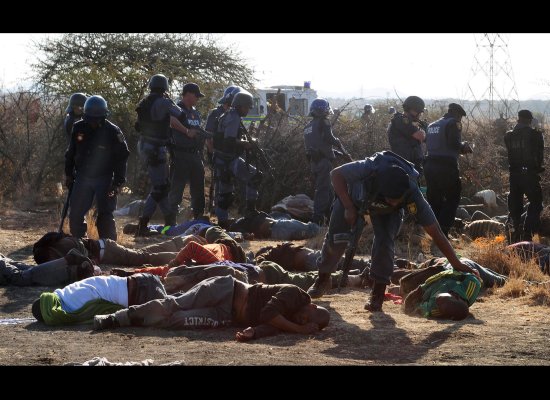At least 30 people have been killed in clashes between police and striking miners in South Africa, in what has been described as the worst violence since the apartheid.
Police opened fire on the 3,000 strikers, who were armed with machetes and sticks outside British-owned mine Lonmin, on Thursday.
Prior to that at least ten had been killed in the violence, with two police officers hacked to death, reported the Independent.
South African journalist Poloko Tau, who has been tweeting from the scene, described the conflict as a "war zone."
The miners wanted their wages tripled for work at the Marikana platinum mine, owned by Lonmin, a London-based company.
Police shot into the crowd as a routine pay dispute, where union members had refused to work for a week, turned violent.
"The South African Police Service was viciously attacked by the group, using a variety of weapons, including firearms," the police service said.
"The police, in order to protect their own lives and in self defence, were forced to engage the group with force."
A police minister told local radio at least 30 people were killed on Thursday, according to Reuters. More workers are pledging to die if their demands were not met.
Nathi Mthethwa told local radio: "A lot of people were injured and the number keeps on going up," reported the BBC.
Armed with machetes, sticks and wooden cudgels, the workers occupied an outcropping of rock near the mine, chanting and dancing, pledging their readiness to die.
Kelebone, who works as a winch operator, told the New York Times said he is paid sbout $500 per month to do difficult, dangerous work. “We need more money,” he said.
In a statement, South African President Jacob Zuma said that he was deeply saddened “at the manner in which a dispute at the industrial level at the Lonmin mine in Rustenburg has degenerated in this manner leading to tragic loss of lives of so many people.”
He added: "We are shocked and dismayed at this senseless violence. We believe there is enough space in our democratic order for any dispute to be resolved through dialogue without any breaches of the law or violence.
"We call upon the labour movement and business to work with government to arrest the situation before it deteriorates any further.
"I have instructed law enforcement agencies to do everything possible to bring the situation under control and to bring the perpetrators of violence to book.
"We extend our deepest condolences to the families of all who have lost their lives since the beginning of this violent action."
Two rival trade unions have blamed each other for the violence during the strike. The emerging Association of Mineworkers and Construction Union and the country's largest mine union, the National Union of Mineworkers, are competing for union membership in South Africa's platinum mines.
Lonmin has been closed its platinum operations. Their mines produce 12% of the world's supply and shares in the company have plummeted.
Original Article
Source: huffington post
Author: Jessica Elgot
Police opened fire on the 3,000 strikers, who were armed with machetes and sticks outside British-owned mine Lonmin, on Thursday.
Prior to that at least ten had been killed in the violence, with two police officers hacked to death, reported the Independent.
South African journalist Poloko Tau, who has been tweeting from the scene, described the conflict as a "war zone."
The miners wanted their wages tripled for work at the Marikana platinum mine, owned by Lonmin, a London-based company.
Police shot into the crowd as a routine pay dispute, where union members had refused to work for a week, turned violent.
"The South African Police Service was viciously attacked by the group, using a variety of weapons, including firearms," the police service said.
"The police, in order to protect their own lives and in self defence, were forced to engage the group with force."
A police minister told local radio at least 30 people were killed on Thursday, according to Reuters. More workers are pledging to die if their demands were not met.
Nathi Mthethwa told local radio: "A lot of people were injured and the number keeps on going up," reported the BBC.
Armed with machetes, sticks and wooden cudgels, the workers occupied an outcropping of rock near the mine, chanting and dancing, pledging their readiness to die.
Kelebone, who works as a winch operator, told the New York Times said he is paid sbout $500 per month to do difficult, dangerous work. “We need more money,” he said.
In a statement, South African President Jacob Zuma said that he was deeply saddened “at the manner in which a dispute at the industrial level at the Lonmin mine in Rustenburg has degenerated in this manner leading to tragic loss of lives of so many people.”
He added: "We are shocked and dismayed at this senseless violence. We believe there is enough space in our democratic order for any dispute to be resolved through dialogue without any breaches of the law or violence.
"We call upon the labour movement and business to work with government to arrest the situation before it deteriorates any further.
"I have instructed law enforcement agencies to do everything possible to bring the situation under control and to bring the perpetrators of violence to book.
"We extend our deepest condolences to the families of all who have lost their lives since the beginning of this violent action."
Two rival trade unions have blamed each other for the violence during the strike. The emerging Association of Mineworkers and Construction Union and the country's largest mine union, the National Union of Mineworkers, are competing for union membership in South Africa's platinum mines.
Lonmin has been closed its platinum operations. Their mines produce 12% of the world's supply and shares in the company have plummeted.
Original Article
Source: huffington post
Author: Jessica Elgot

No comments:
Post a Comment